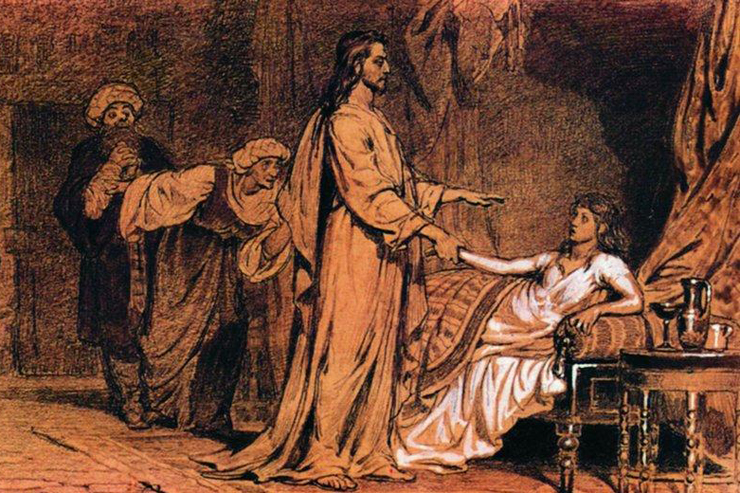Too Enlightened To Believe?
by Marcellino D'Ambrosio, Ph.D. | July 4, 2014 1:00 am
 [1]
[1]“Raising of Jairus’ Daughter” (detail) by Ilya Repin
In the days when states of the United States were still “the colonies” and men wore powdered wigs, a new way of thinking captured the intelligentsia of the western world. “The miracle stories in the Bible and the lives of the saints may be quaint, entertaining, and even have symbolic meaning. But certainly we should not take them literally! Oh, God exists, for sure. But if the Creator made such a marvelous world, humming along according to the laws of nature which he designed, why would he ever step in and work against those rules? So let’s not be naive.”
Thomas Jefferson went so far as to take scissors and cut all the supernatural stories right out of his Bible, leaving only the moral teaching of Jesus. Others insisted on keeping their bible intact, but reading the miracle stories with a wink and a nod, just like they read Greek mythology. This movement, known as the Enlightenment, was just too sophisticated to take literally such primitive fantasy.
To tell the truth, the Enlightenment raised a very good question. Why would the creator of nature violate natural laws? Perhaps because not everything we experience in this fallen world is so “natural” after all.
The first chapter of the Book of Wisdom tells us that death is really not “natural.” God designed human beings to live forever. It was by the envy of the devil that death came into the world, and the spiritual death resulting from the sin of our first parents had a disastrous impact on all of creation. One of the foremost Enlightenment philosophers, Gottfried Leibniz, said that the world we live in was the best of all possible worlds. Genesis and the book of Wisdom beg to differ.
So perhaps God works miracles and defies seemingly “natural” laws to restore nature, to rescue his creation from the degradation and misery that sin has let loose in the world. Plus, in the case of truly natural laws, if He created nature, he is above nature. “Nature” comes from the Latin word for birth. Nature is that which has been born, which has come into existence. Our God, unlike the gods of the Greek and Roman myths, has no beginning or end. He was, He is, and He is to come. He is therefore transcendent, above nature, super-natural.
This is the point Mark’s gospel is making when it tells us about Jesus calming the storm, healing the woman with the flow of blood, and raising Jairus’ daughter (Mark 5:21-43). Standing in front of Jesus, we are in the presence of Mystery. He does not plead or conjure or recite incantations. He does supernatural things not through petition but by word of command. Sophisticated skepticism is a useless response to Him. So is fear. If I want to experience the saving, life-giving power that He offers me, the only useful and appropriate response is faith. Before the tragedies and challenges of life in this imperfect world, this is what faith says: “I can’t, He can, and I think I’ll let Him.”
Many children were ill in Palestine on that day. But Jairus believed that Jesus could do something about the sickness assaulting his daughter, and let him, despite the ridicule of his friends. Many adults physically touched Jesus on that day as he made his way through the crowd, but only one woman believed Jesus could heal her. She had the boldness to reach out and touch him with expectant faith, and healing power flowed out of him, changing her life forever.
If the Eucharist is truly the Body and Blood of this supernatural miracle worker, why don’t we see more healing, miracles, and sanctification going on in the lives of communicants?
Maybe it’s because many who shuffle forward in communion lines each Sunday are like the nameless people who bumped into Jesus in the square but were too busy to notice and too jaded to expect anything. Or maybe it’s because we’re just too “enlightened” to take such quaint Bible stories too seriously.
If you liked this article, please share it with your friends and family using the Recommend and Social Media buttons below and via email. We value your comments and encourage you to leave your thoughts below. Thank you! – The Editors
- [Image]: http://www.integratedcatholiclife.org/wp-content/uploads/raising-of-jairus-daughter-detai-featured-w740x493.jpg
Source URL: https://integratedcatholiclife.org/2014/07/dambrosio-sunday-reflection-too-enlightened-to-believe/